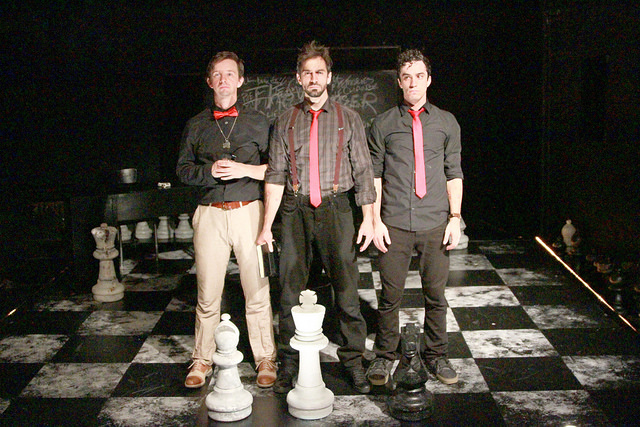
As part of Bronx Community College's opening convocation this year, school officials commemorated the death in June of 22-year-old student Kalief Browder, who had enrolled after spending 3 years in Riker's without being convicted, a period that included beatings and hundreds of days of solitary confinement. Though Browder's situation may appear extreme, its eventual outcome is not unusual. The playbill for Phil Blechman's The Black Book notes that eleven percent of all deaths of persons between the ages of 15 and 24 are suicides, which works out to one suicide just under every two hours. Blechman began working on the play, which debuted professionally in New York City in 2012, in response to a college classmate's suicide in 2007 and with the aim of finding reason within the experience.
The Black Book's stated goal is to lead audiences to similarly think through the "why" of self-murder. Arthur Chase (Gabe Templin) has just returned as a professor to the college that he attended as an undergraduate at the request of his longtime friend Axel Cooper (Sean Borders), another alumnus teaching at the school. In short order, Colin Archer (David Siciliano), a student whom Chase is convinced has not been attending his Advanced Poetry class, leaves his professor an ominous poem (a copy of which, complete with hand-burned edges, is included in the program) that could be read as pointing towards suicide. (Equally ominously, Arthur and Axel refer to students who skip class as “jumpers.”) His attempts to deal with Archer's poem eventually involve not only Axel but also faculty members Julie Edwards (Margy Love), whom Axel is in the midst of persistently courting, and Riley Andrews (Catie Humphreys). Riley's past, meanwhile, contains a tragic event connected to her brother Michael (Joe Reece) and his on-again, off-again girlfriend Nicole (Haley Dean).
The revelations that accumulate during The Black Book play out on a giant chessboard, complete with pieces that, though primarily ornamental, occasionally enter the main action. At one point, chess aficionado Archer even plays with another character on a smaller board on the floor, creating a kind of chess inception appropriate to the increasingly twisty narrative. The mirrors that cover the back side of the onstage chalkboard serve a similarly symbolic function. Early on, Axel and Arthur talk about how Mets fans are stuck in a never-ending cycle of hope and disappointment, as each season renews the perennially frustrated possibility of a team that will not collapse after a strong start, and the play stresses the themes of memory -- its pain, its wilful forgetting, its ultimate inescapability -- throughout. Archer's poem itself, ending with ellipses in place of the final rhyme word, also operates thematically, metaphorizing the unfinished nature of these characters' lives, as well the spaces within which they must make decisions: to remember or suppress, to live or to die.
Initially, the faculty interaction and their attitudes toward their students are disturbingly dismissive, with no one seeming to be responding to a student in need in anything like a helpful manner. However, confusion and uncertainty are prominent throughlines here, and The Black Book gradually makes it clear that the audience isn’t on as sure a footing with regards to its understanding of events as it appears for a time. More and more as the play progresses, and arguably even after its ending, it forces audience members to revise their picture of the characters’ identities and actions, both past and present, most radically during one very visually striking set transformation late in the proceedings. David Siciliano’s intense turn as the constantly smoking Archer helps to keep things just a little off balance as well, as he delivers some of his lines directly to audience members and sometimes explicitly breaks the fourth wall, such as when the play cleverly puts the audience in the role of students while Archer has them read his poem along with him. The effects created by Archer’s institutionalized sister C.C. (Antonieta Pereira) frequently patrolling the periphery and the upper area of the stage, the dramatic sound cues marking the frequently rapid scene changes, and an eerie, evolving sung refrain contribute effectively to the unsettling atmosphere as well.
Blechman's play aims for big questions, even when its answer is that there is no answer. One conclusion that The Black Book reaches is that we can't be sure, that we can't generalize about things like suicide, although we get a fairly logical explanation in this one specific case. However, the play is at its best when it lets the action do the talking rather than having characters directly address the audience in attempts to apply their newly-acquired and imperfectly developed knowledge of philosophy, psychology, and other college subjects to the world around them. When it’s raising questions rather than directly asking them, it’s a blackly effective thriller, one that we suspect would be particularly disturbing to our fellow professors. Like teaching itself, The Black Book isn't perfect, but it is overwhelmingly successful with more than a few moments that have real staying power. - Leah Richards and John Ziegler
